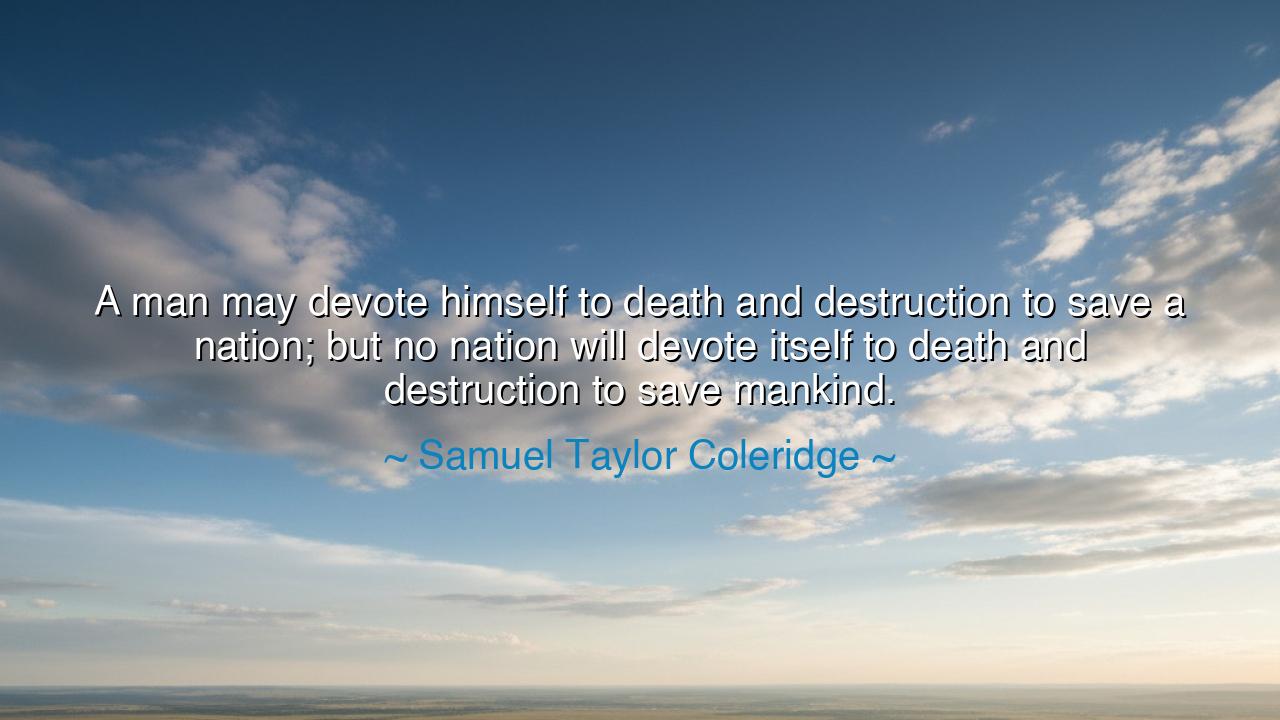
A man may devote himself to death and destruction to save a
A man may devote himself to death and destruction to save a nation; but no nation will devote itself to death and destruction to save mankind.






“A man may devote himself to death and destruction to save a nation; but no nation will devote itself to death and destruction to save mankind.” — thus wrote Samuel Taylor Coleridge, the poet and philosopher who gazed deeply into the human soul and found within it both greatness and frailty. His words are not merely a judgment on nations, but a lament for the limits of human virtue when bound by borders. They speak of the eternal struggle between individual sacrifice and collective self-interest, between the hero’s heart and the nation’s ambition. In this single sentence, Coleridge unveils the paradox of civilization — that the courage of one man can surpass the conscience of millions.
To understand this truth, one must remember the world from which it came. Coleridge lived in an age of revolutions and wars, when the banners of nations were raised high in the name of freedom, yet the fields were stained with blood. He saw how patriotism, noble in spirit, could become a veil for violence; how men could die for their homeland with pure hearts, yet nations, as vast and self-interested entities, rarely acted from pure motives. Thus, he wrote these words not to condemn the brave, but to reveal the blindness of the powerful — that nations, composed of men, can be moved by honor and duty, but as institutions, they serve their own survival before they serve humanity.
In this, Coleridge stands in the long line of thinkers who saw the dual nature of mankind. The ancient Greeks told the story of Prometheus, who defied the gods and gave fire to humanity, suffering eternal torment for the sake of others. Prometheus represents the individual who gives everything for the greater good — one who “devotes himself to death and destruction” so that others may live. But there is no nation of Prometheans. No empire, no kingdom, no republic has ever willingly sacrificed itself for the world at large. Nations fight to preserve themselves; they do not fall willingly for others. It is always the individual — the hero, the prophet, the martyr — who bears the cost of conscience.
History bears witness to this truth. Think of Mahatma Gandhi, who offered his body and life for the liberation of his people, or Martin Luther King Jr., who faced death for justice and peace. Each stood as one against many, offering themselves as bridges between hatred and hope. But when nations were asked to act as they did — to put aside pride and profit, to labor and die for the good of all humankind — they faltered. Wars fought in the name of humanity too often disguised the old motives of power, greed, and fear. Coleridge’s sorrow is not cynicism; it is recognition. He knew that nations, for all their might, lack the soul that gives men the strength to love beyond their tribe.
Yet within these words, there is not only sadness, but a challenge. For if nations cannot act as one for mankind, then it falls upon the individual to embody that ideal. The poet reminds us that the salvation of humanity does not begin in parliaments or armies, but in the heart that dares to rise above its own circle of belonging. A single person, moved by compassion and guided by truth, can kindle a light brighter than the flags of nations. Such a person may be destroyed, but their spirit becomes the seed of change — a fire that no boundary can contain.
The ancients would have called this the path of the just soul, the one who acts not for glory, nor for country, but for the divine spark within all living beings. It is the way of Socrates, who drank the hemlock rather than betray truth; of Jesus, who forgave those who crucified him; of Coleridge himself, who wrestled not with empires, but with his own conscience, striving to reconcile faith with reason, poetry with morality. To devote oneself to death and destruction to save mankind is not to seek death, but to be willing to give all that one is for the good that transcends the self.
So let this be the lesson for all who listen: do not wait for nations to save the world. Nations are bound by borders, but the human spirit is boundless. Be the one who acts where others hesitate, who loves where others divide, who sacrifices where others grasp. Serve humanity, not because it will reward you, but because it is right. The greatness of the world depends not on the decrees of governments, but on the courage of the individual soul.
For as Samuel Taylor Coleridge reminds us, nations may never devote themselves to mankind — but one heart, set aflame by compassion, can move the world. And though such hearts may perish, their light endures, outliving nations, outlasting time, and reminding all generations that the true salvation of humanity lies not in power, but in sacrifice.






AAdministratorAdministrator
Welcome, honored guests. Please leave a comment, we will respond soon